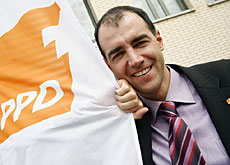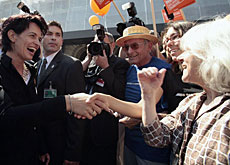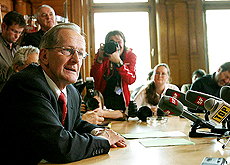Navigating the party between left and right

The new head of the Christian Democratic Party, Christophe Darbellay, tells swissinfo how he plans to re-establish the party as the third-largest political force.
Darbellay outlines the current challenges of walking the political tightrope in Switzerland, which remains sharply polarised between left and right.
The parliamentarian from canton Valais, who was elected president of the centre-right Christian Democrats on September 2 with 214 out of 218 votes, recently stirred up controversy with his comments that Justice Minister Christoph Blocher should not be re-elected to cabinet.
As head of the Christian Democrats, his main task is to lead them to victory in the 2007 federal elections. But this will not be easy, as large numbers of voters have turned their backs on the party over recent years.
This has resulted in the Christian Democrats losing their position as the third-largest party and having to give up one of their cabinet seats. To get things back on track, Darbellay hopes their new programme will be able to seduce voters back to the centre.
swissinfo: As president of the party, what is your opinion of the Christian Democrats?
Christophe Darbellay: I am critical, but I have a positive outlook. The party has gone through some difficult times recently with the loss of a cabinet seat.
But we have modernised our programme, which is now very clear and proposes an interesting political direction for our traditional voters and others who might want to support us.
I feel we are on the right track, but we still have a long way to go, as there are no obvious signs that the left-right political divide is narrowing.
swissinfo: Your party has always defended family values and small and medium-sized companies. Are these still part of your political programme?
C.D.: Yes, but we are also emphasising new issues such as employment and social insurance.
We obviously want to hold onto our traditional supporters in regions where we are strong. But we also want to talk to new voters.
We feel that in urban areas there are many different people who are open to our ideas, such as young people who do not normally vote for either leftwing or rightwing parties.

More
Christian Democratic Party
swissinfo: Over recent years the Swiss political scene has become increasingly polarised between left and right. How does a centre-right party, such as the Christian Democrats, deal with such a situation?
C.D.: My predecessor, the new economics minister, Doris Leuthard, and I have always had to walk a tightrope between the two extremes. And of course there has to be a certain give and take with regard to the different tendencies within the party.
The party decides its own policies. We have a political programme and we are not dependent on any other parties. But obviously we forge alliances with others according to the issue, such as the [centre-left] Social Democrats for social security questions or social policies in general. But there are also tricky issues such as federal finances, where we tend to ally ourselves with the right.
An alliance really depends on the particular subject in hand, but there is no strategy to bring us closer together with another party.
swissinfo: The Christian Democrats are sometimes at odds with religious groups, in particular over revisions to the laws on asylum and foreigners. Shouldn’t your party drop its close ties to the church?
C.D.: This debate took place at a time when we were re-writing our political programme in 2004. Most of our supporters expressed their wish to maintain the party’s connection with Christian values.
I think this was a good decision. These are timeless values that are a lot more modern than people imagine. But I should also add that we have several differences of opinion with the church. Such things happen; I just hope that we can have better relations in the future.
I also feel that there have been several misunderstandings, especially over the law on foreigners. This law is good for Switzerland and fixes certain criteria and principles relating to immigration, which are very important.
But the debate about asylum law is much more sensitive, as it has a less technical and more human face to it; it’s extremely symbolic. We believe that the unacceptable parts of the law have been dropped and the law now allows practical issues to be resolved.
swissinfo: What are your expectations of the 600,000-plus Swiss who live abroad?
C.D.: For me the most important thing is that Swiss expatriates remain committed and keep in touch with their homeland. As they are able to look at what is going on with more distance and a critical eye, I think it is crucial they continue to participate in what is happening here in Switzerland.
But whatever the party, I don’t feel we have managed to integrate them properly into our discussions. We therefore have to find new ways so that these people can express themselves more directly in national debates.
swissinfo-interview: Olivier Pauchard
The Christian Democratic Party is currently the fourth-largest political party in Switzerland. It received 14.4% of the vote during the last federal elections in 2003.
The party is one of the four strongest that are represented in the federal government, alongside the Swiss People’s Party, the Radical Party and the Social Democratic Party.
At the federal level, the Christian Democrats have:
One minister
15 seats (out of 46) in the House of Representatives
28 seats (out of 200) in the Senate.
At 35, Christophe Darbellay is the youngest president of a Swiss political party.
He has been a parliamentarian in the House of Representatives since 2003.
He started politics as a member of the Social Christian Party in canton Valais and describes himself as a “centrist with social leanings”.
Trained as a agronomist, Darbellay was deputy-head of the Federal Agriculture Office from 2000-2004, before becoming head of the Swiss Veterinarians’ Association.

In compliance with the JTI standards
More: SWI swissinfo.ch certified by the Journalism Trust Initiative













You can find an overview of ongoing debates with our journalists here . Please join us!
If you want to start a conversation about a topic raised in this article or want to report factual errors, email us at english@swissinfo.ch.